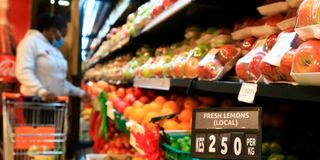'Weh...' Middle class now migrates to Kadogo economy as inflation bites

A customer picks fruits at a supermarket in Nyeri on August 7, 2021. Key economic players have expressed concerns over the rising inflation.
Consumers are shunning premium goods and buying cheaper options amid reduced disposable incomes.
A superbrands consumer insights survey shows buyers across different purchasing classes are opting for affordable brands because of budget constraints brought forth by the high cost of living.
The survey by East Africa’s market research agency, Kantar TNS, adds that the shift to low-value brands is no longer solely for the mass market but is also more visible to even the middle-class consumer.
This follows a jump in the overall cost of living, arising from high fuel prices. Sectors that have been affected include fast-moving consumer goods and household items.
The survey was administered to urban consumers in the first half of 2022 from Nairobi, Mombasa and Kisumu across all classes.
“With the middle-class consumer now experiencing brands across different price points in search of low-cost, higher value alternatives are better informed and more selective. This now places them in a better position to truly decide which brands they believe are superbrands across the different categories. The Kenyan consumer of today wants innovation and functionality,” Mr David Ogara, manager, Kantar TNS said.
Inflation hit a 58-month high in June to 7.9 percent — above the government’s upper limit target — from 5.08 percent in February, due to soaring prices of food items on account of bad weather, high fuel prices and transport costs.
Most of the household items that have recorded a rise in prices include wheat and maize flour, detergents, bar soaps, cooking oil and fresh packeted milk.
“With increased adoption of e-commerce throughout the Covid-19 era, consumers are now increasingly researching about products before they make their purchase decisions," the research said, adding that some consumers are starting to emphasise differentiation, and punishing brands that are more premium, but not differentiated from the low-priced mainstream brands.
CEO concerns
The survey looked at the popularity of brands in Kenya with mobile money service, M-Pesa, leading parent company Safaricom, which was placed second.
Medical and hygiene brands have moved up, for example, Jik was up to three from rank 36 in 2020, St. John Ambulance to 19 from rank 51, and Dettol up to six from rank nine. No betting company featured in the top 20 ranking due to reduced consumer disposable incomes.
The inflation surge is expected to slow consumer spending, dragging investment and economic growth.
Inflation and the rising cost of production remain top concerns for most CEOs as it is expected to dampen expansion and investment decisions at a time high business recovery was anticipated after the impact of Covid-19.





